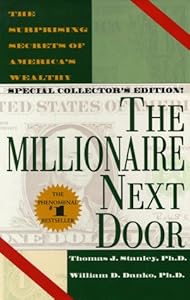The Millionaire Next Door
Thursday, June 12, 2008
The Millionaire Next Door
By Thomas J, Stanley and William D. Danko, 1996You should know
Many of the personal finance blogs I read have spoken highly of this book, so it went on my reading list.So?
It wasn't entirely what I expected. The authors conducted a massive study of households that are wealthy according to their formula: those who have a net worth equaling their annual income multiplied by one-tenth their age.They then compared the trends among these individuals, and compared them to individuals who have high incomes but very low net worths. The wealthy tend to be more interested in frugality, and less interested in conspicuous consumerism, often to the point where only people with access to their finances even know they are wealthy.
But, as I said, it wasn't quite what I expected. At one point, the authors display a chart of what the wealthy, versus apparently wealthy consumers, fear. There was plenty of insight as to why the non-savers fear certain things more than the savers. However, there were certain thing the savers feared more, and no word on why.
There is also a good description of why entrepreneurs are more likely to be wealthy, according the definition in this book, than people with high-income, high-status jobs like doctors and lawyers. Entrepreneurs are likely to go on living the way they did before they amass their wealth. People in high-status jobs, by contrast, feel pressure to look high-status. They fear that if they look less financially successful, their potential clients will suspect that they are unsuccessful due to incompetence, and not hire them.
Definitely don't consider it a how-to book. It's much more on the inspirational side, explaining what these millionaires are like but not giving much in the way of instructions on how to become one. If you see yourself on one side of the equation or the other, it may give you a kick in the right direction, but it's no road map.
While I didn't get much practical information out of it, I did enjoy the case studies and the patterns they revealed. If you need a reminder that wealth and shiny things don't necessarily go hand-in-hand, it's a good read.
The rest of the Internet
JD at Get Rich Slowly actually has one of these millionaires next door.The New York Times review.
The Wikipedia entry.
The book on LibraryThing.
A good summary of the book's main points at MSN.

![Reblog this post [with Zemanta]](http://img.zemanta.com/reblog_c.png?x-id=03e2a1b2-d6cf-4269-82b2-90e3d1592e91)